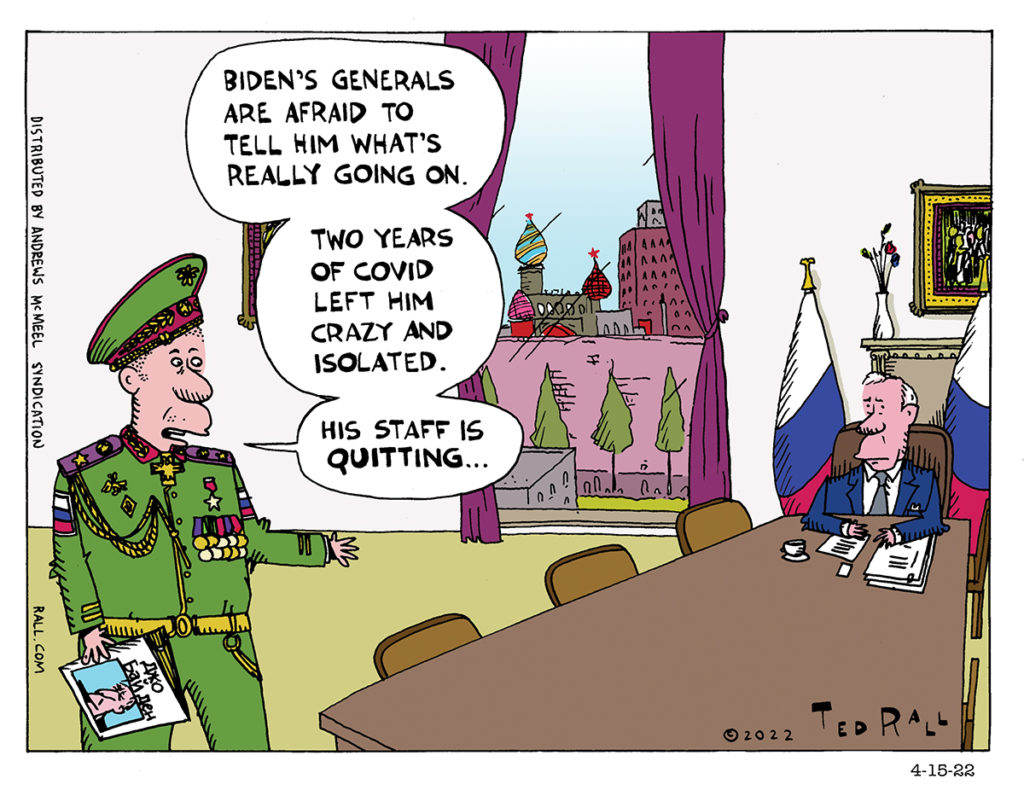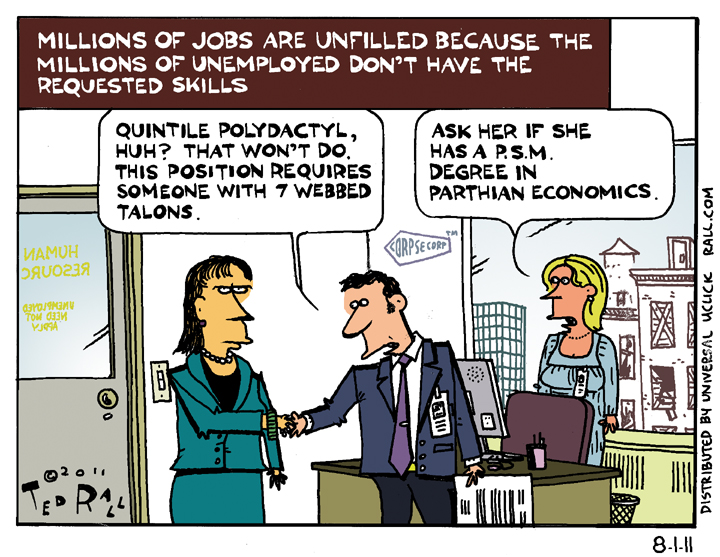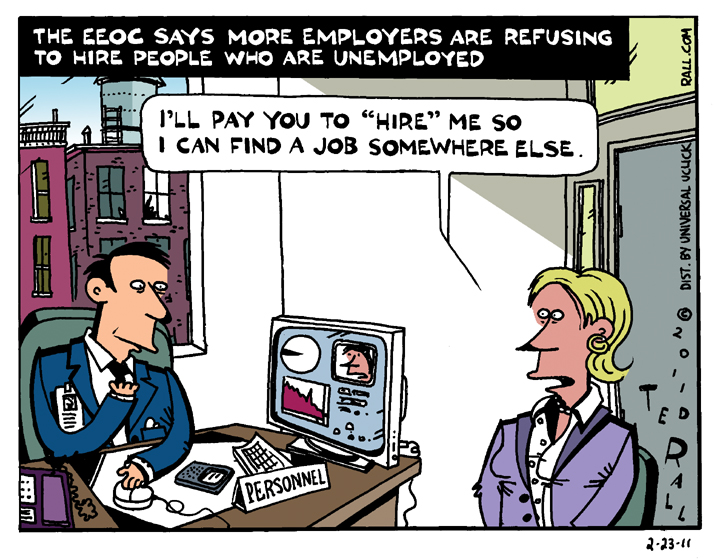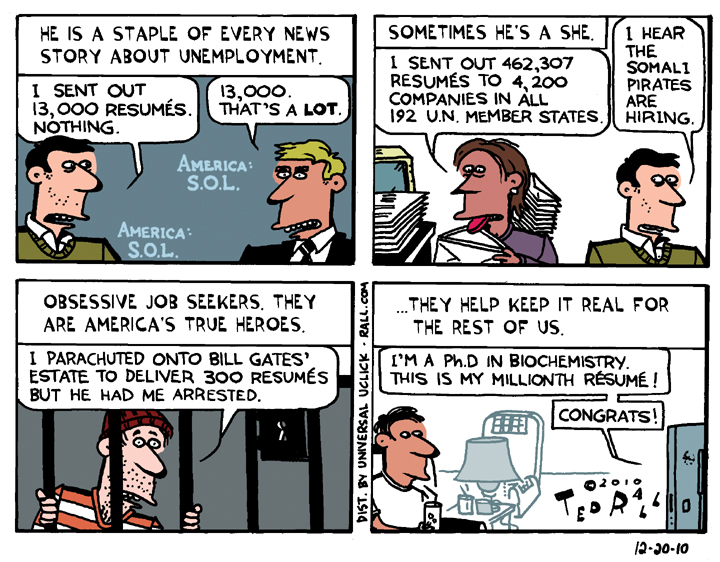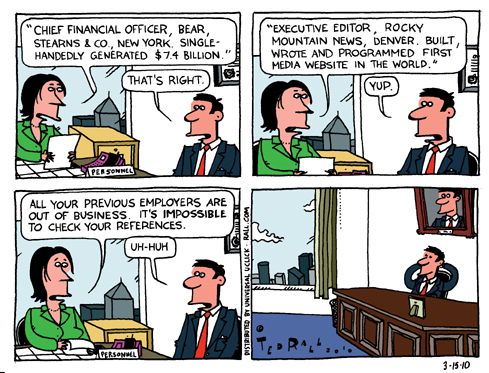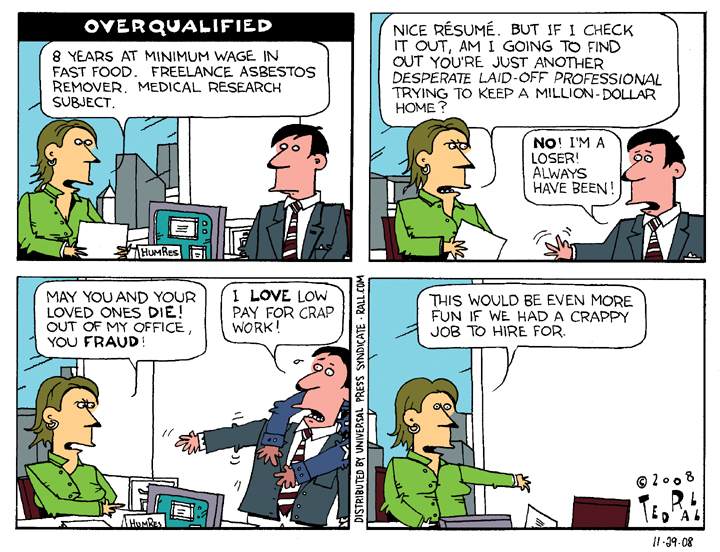It’s impossible to know whether any of this is true or even if US intelligence agencies really believe it, but part of the propaganda war against Russia is spreading the message that president Vladimir Putin is out of touch, doesn’t really know what’s going on and is losing his mind after two years of COVID-19 related lockdowns. Of course, it’s entirely possible that the Russians believe the same things about American president Joe Biden.
Who Lost Afghanistan? H.R.
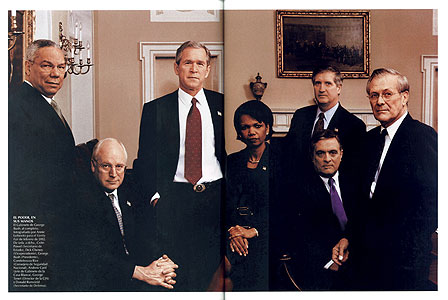
Congress, the media and many voters are asking military officials this week: how did we lose the Afghan war? I’ve been reading a book, “The Afghanistan Papers,” by Washington Post reporter Craig Whitlock, that shows how America messed up its longest war. (Every now and then, corporate media hypes something that’s actually worth reading.)
What it does not show, and what Pentagon leaders don’t seem to understand, is why.
Whitlock’s book reads like a synopsis of the many essays, books and cartoons I produced over 20 years, which were rejected by most newspapers and news websites because editors and producers refused to publish content that criticized the war.
For instance, Whitlock echoes my longstanding insistence that the Taliban posed no threat to the United States: “The Bush administration made another basic mistake by blurring the lines between Al Qaeda and the Taliban,” he writes. “The two groups shared an extremist religious ideology and a mutual support pact, but pursued different goals and objectives. Al Qaeda was primarily a network of Arabs, not Afghans, with a global presence and outlook… In contrast, the Taliban’s preoccupations were entirely local… The Taliban protected bin Laden and built a strong alliance with Al Qaeda but Afghans did not play a role in the 9/11 hijackings and there is no evidence they had advance knowledge of the attacks.”
We spent 20 years fighting people who meant us no harm and couldn’t have hurt us even if they had wanted to.
While the after-action investigation is necessary and interesting — I’m following it every day — the postmortem necessarily focuses on acts of commission and omission during the war, after it started. Perhaps because both major political parties were equally complicit in the invasion as a knee-jerk response to 9/11, or because both the Democrats and the Republicans are in the pockets of the defense industry, no one is questioning the decision to start the war, only its atrocious execution and embarrassing wind-down.
The sad truth is, the same screwups will continue. We will keep beginning wars against countries we ought to stay away from. We will make the same mistakes throughout the duration of those wars. Nothing will change because nothing has changed.
The reason is simple: personnel. Presidents keep hiring the wrong people to make decisions about war and peace. And the right ones never have a seat at the table in the room where it happens.
Voters who want to avoid fighting another Afghanistan war must insist upon candidates who promise to include anti-interventionists among their top military advisers and in their cabinet. They should withhold their votes from politicians, even liberal Democrats, who refuse to promise to include pacifists, war skeptics and isolationists among their inner circle. Personnel is policy, they say in Washington, and that is never truer than when someone near the President of the United States suggests military action.
Eisenhower was one of the last American political leaders to understand the importance of drawing advice from an ideologically diverse group. “I know of only one way in which you can be sure you’ve done your best to make a wise decision,” Ike said. “This is to get all of the people who have partial and definable responsibility in this particular field, whatever it may be. Get them with their different viewpoints in front of you, and listen to them debate.”
Unfortunately, there’s hardly any debate on whether or not to go to war.
What passed for diversity of opinion in the George W. Bush cabinet was a group of hawks with different styles and proclivities, but hawks nonetheless. After 9/11 Bush’s “war cabinet” included his notoriously bellicose Vice President Dick Cheney, National Security Adviser Condoleezza Rice, Secretary of State and former General Colin Powell, Secretary of Defense Donald Rumsfeld, Chief of Staff Andrew Card, and CIA director George Tenet. No experts on Afghanistan were invited. No academics, no journalists, no one who had even spent a single night in a house in Afghanistan.
Predictably, all the choices discussed involved military action. “The war cabinet considered several options for the U.S. pursuit of Al Qaeda in Afghanistan: a strike with cruise missiles, cruise missiles combined with bomber attacks, or ‘boots on the ground,’ that is U.S. soldiers in Afghanistan,” James P. Pfiffner noted in the journal Issues in Governance Studies. Most Americans now agree that the war was a mistake.
Bush should have stayed out of Afghanistan entirely.
Some people felt that way at the time, when it mattered, before we wasted trillions of dollars and killed hundreds of thousands of innocent people. But antiwar Americans were ridiculed when they weren’t simply being ignored. Bush couldn’t make the right decision because no one who had his ear ever argued for it.
Joe Biden is a different and hopefully better president than George W. Bush, yet his group of advisers suffers from the same lack of ideological diversity. No one who generally opposes war meets with the president on a regular basis. When there’s a foreign policy crisis, none of Biden’s senior advisers can be counted upon to argue against getting involved.
Understanding how we lost Afghanistan is useful.
If we want to understand why we lost Afghanistan, and if we want to stop the next Afghan war before it starts, we should look at who.
(Ted Rall (Twitter: @tedrall), the political cartoonist, columnist and graphic novelist, is the author of a new graphic novel about a journalist gone bad, “The Stringer.” Order one today. You can support Ted’s hard-hitting political cartoons and columns and see his work first by sponsoring his work on Patreon.)
If Biden Loses, This Will Be Why

It would be a stretch to say that Joe Biden is in trouble. He is ahead in the polls, including in states where Donald Trump won last time. Unlike Trump, who is nearly broke, Biden’s campaign is raking in corporate donations.
Of course, Democrats couldn’t have asked for a weaker incumbent. Nearly 200,000 Americans dead of COVID-19 after the president downplayed the threat and failed to provide relief, tens of millions of people newly unemployed months away from the election, polls showing that a record number of voters believe the country is headed in the wrong direction, supplemental unemployment benefits expired with no sign that they will ever be renewed. Almost any other candidate would be poised to trounce Trump by double-digit landslide of historical proportions.
Not Biden.
The two crazy old white men with bad hair are in a dead heat in key battleground states like Florida. As one would expect during a normal year—when the president had not just killed a bunch of voters and made a bunch of others jobless—the race is tightening. Biden is still ahead by seven points nationally but that’s not significantly better than Hillary Clinton was doing at the same point in time. A worried Bernie Sanders has been advising Biden to nix his vague rightward pivot and articulate stronger stances on bread-and-butter issues.
More than any other single factor, I am focused on the enthusiasm gap. Anyone who counts yard signs and bumperstickers can see that Trump’s supporters are fired up while Biden’s are dutifully going through the motions, motivated primarily by their desire to unseat the incumbent.
Like most elections in recent years, 2020 isn’t about swaying swing voters on the fence. It’s a turnout game. Whoever gets more of their baked-in supporters to the polls wins. Not only are Biden’s supporters not all that into him, more of them are scared of the coronavirus than Trump’s people—and that could make all the difference when they decide whether or not to leave their homes on Election Day.
Then there’s the debates. Biden could exceed expectations. But those expectations are there for a reason. Biden has never been a good debater; he was awful during the primaries. He is well past his expiration date. He is easily rattled (“lying dog-faced pony soldier”) and Trump is a master rattler. Debates could destroy Biden.
Setting aside the almost inevitable constitutional crisis caused by the system’s inability to deliver and process an expected 80 million mail-in ballots, there is a real chance Donald Trump could straight out win.
At this point, there are still several things that Biden could do to maintain and even expand his lead over the president. If I were advising him, I would tell him to do the following:
Nail Down the Base. The progressive Democrats who supported Bernie Sanders and Elizabeth Warren during the primaries are not, contrary to statements by the old liberal centrists, “purity ponies” determined to punish the Democratic Party because their preferred candidate didn’t win. They are driven by policy—and so far the Biden campaign has refused to throw them any red meat. Democrats can truly unify the party in November by getting Biden to campaign on at least one major issue dear to progressives, like Medicare For All, the Green New Deal, or swearing off wars of choice. It would be smart to add in some minor promises with symbolic residence, like prosecuting CIA torturers, Closing Gitmo, eliminating drones, refusing to prosecute Julian Assange and allowing Edward Snowden to come home. Progressives don’t need the whole cow. But you do have to throw them a bone, or risk losing them the way Hillary did in 2016.
Weasel Out Of the Debate. If he followed this advice, I would be even more determined not to vote for him. Denying voters the right to watch candidates answer questions about themselves and their stances is profoundly undemocratic. Still, ethics aside, debating can only help Trump. If I were Biden, I’d refuse to prove to the country what every honest person who has been paying attention knows: he is suffering from dementia.
Announce an Agenda for the First 100 Days. Biden likes to compare himself to FDR. Like FDR, he should announce his agenda for his first 100 days in office. That way, should he win, Republicans won’t be able to argue that he didn’t earn a mandate for specific changes. During this time of medical and socioeconomic crisis, Americans crave specific solutions to their problems. While it is true that staying vague frustrates the writers of GOP attack ads, it also feeds the suspicion that Biden, like Obama, is all hat and no cattle when it comes to trying to legislate big changes.
Personnel Is Policy so Appoint Personnel Now. Progressives were let down in a big way by the choice of right-wing prosecutor Kamala Harris as Biden’s vice president. Biden supporters’ most frequently uttered talking point is that he would appoint better qualified cabinet members than Trump has, but keeping losers like Lawrence “Women Can’t Do Math” Summers among his closest advisors and compiling a foreign policy team so full of neoconservatives that only Dick Cheney is missing doesn’t inspire confidence. Writing a blank check doesn’t make sense anymore. Let’s see some of those cabinet appointments now, before we vote.
Campaign in Person. Last but not least and probably most controversially, Biden needs to hit the road like COVID-19 never happened. Elections are job interviews and Donald Trump seems to want the gig. Biden doesn’t. He needs to appear in public, distance socially, no mask, heavy schedule of in-person appearances. Most Americans venture out in public every single day these days and manage not to contract COVID-19. Surely Biden’s handlers can figure out how to do the same for their candidate.
(Ted Rall (Twitter: @tedrall), the political cartoonist, columnist and graphic novelist, is the author of the biography “Political Suicide: The Fight for the Soul of the Democratic Party.” You can support Ted’s hard-hitting political cartoons and columns and see his work first by sponsoring his work on Patreon.)

